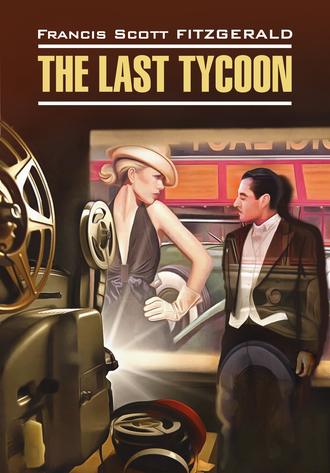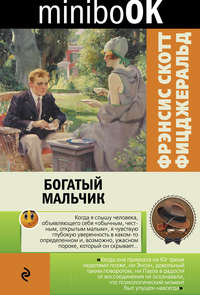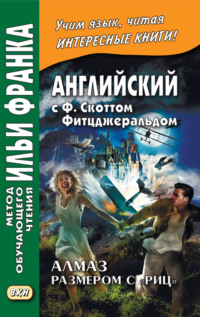
Полная версия
The Last Tycoon / Последний магнат. Книга для чтения на английском языке
“Ain’t writers like that, Celia?” demanded Schwartz. “I have no words for them. I only know it’s true.”
Wylie looked at him with slowly gathering indignation. “I’ve heard that before,” he said. “Look, Manny, I’m a more practical man than you any day! I’ve sat in an office and listened to some mystic stalk up and down for hours spouting tripe that’d land him on a nut-farm anywhere outside of California – and then at the end tell me how practical he was, and I was a dreamer – and would I kindly go away and make sense out of what he’d said.”
Mr. Schwartz’s face fell into its more disintegrated alignments. One eye looked upward through the tall elms. He raised his hand and bit without interest at the cuticle on his second finger. There was a bird flying about the chimney of the house, and his glance followed it. It perched on the chimney pot like a raven, and Mr. Schwartz’s eyes remained fixed upon it as he said: “We can’t get in, and it’s time for you two to go back to the plane.”
It was still not quite dawn. The Hermitage looked like a nice big white box, but a little lonely and vacated still after a hundred years. We walked back to the car. Only after we had gotten in, and Mr. Schwartz had surprisingly shut the taxi door on us, did we realize he didn’t intend to come along.
“I’m not going to the Coast – I decided that when I woke up. So I’ll stay here, and afterwards the driver could come back for me.”
“Going back East?” said Wylie with surprise. “Just because —”
“I have decided,” said Schwartz, faintly smiling. “Once I used to be a regular man of decision[19] – you’d be surprised.” He felt in his pocket, as the taxi driver warmed up the engine. “Will you give this note to Mr. Smith?”
“Shall I come in two hours?” the driver asked Schwartz.
“Yes… sure. I shall be glad to entertain myself looking around.”
I kept thinking of him all the way back to the airport – trying to fit him into that early hour and into that landscape. He had come a long way from some ghetto to present himself at that raw shrine. Manny Schwartz and Andrew Jackson – it was hard to say them in the same sentence. It was doubtful if he knew who Andrew Jackson was as he wandered around, but perhaps he figured that if people had preserved his house Andrew Jackson must have been someone who was large and merciful, able to understand. At both ends of life man needed nourishment: a breast – a shrine. Something to lay himself beside when no one wanted him further, and shoot a bullet into his head.
Of course we did not know this for twenty hours. When we got to the airport we told the purser that Mr. Schwartz was not continuing, and then forgot about him. The storm had wandered away into Eastern Tennessee and broken against the mountains, and we were taking off in less than an hour. Sleepy-eyed travellers appeared from the hotel, and I dozed a few minutes on one of those Iron Maidens[20] they use for couches. Slowly the idea of a perilous journey was recreated out of the debris of our failure: a new stewardess, tall, handsome, flashing dark, exactly like the other except she wore seersucker instead of Frenchy red-and-blue, went briskly past us with a suitcase. Wylie sat beside me as we waited.
“Did you give the note to Mr. Smith?” I asked, half asleep.
“Yeah.”
“Who is Mr. Smith? I suspect he spoiled Mr. Schwartz’s trip.”
“It was Schwartz’s fault.”
“I’m prejudiced against steam-rollers,” I said. “My father tries to be a steam-roller around the house, and I tell him to save it for the studio.”
I wondered if I was being fair; words are the palest counters at that time in the morning. “Still, he steamrollered me into Bennington and I’ve always been grateful for that.”
“There would be quite a crash,” Wylie said, “if steamroller Brady met steam-roller Smith.”
“Is Mr. Smith a competitor of Father’s?”
“Not exactly. I should say no. But if he was a competitor, I know where my money would be[21].”
“On Father?”
“I’m afraid not.”
It was too early in the morning for family patriotism. The pilot was at the desk with the purser and he shook his head as they regarded a prospective passenger who had put two nickels in the electric phonograph and lay alcoholically on a bench fighting off sleep. The first song he had chosen, “Lost,” thundered through the room, followed, after a slight interval, by his other choice, “Gone,” which was equally dogmatic and final. The pilot shook his head emphatically and walked over to the passenger.
“Afraid we’re not going to be able to carry you this time, old man.”
“Wha?”
The drunk sat up, awful-looking, yet discernibly attractive, and I was sorry for him in spite of his passionately ill-chosen music.
“Go back to the hotel and get some sleep. There’ll be another plane tonight.”
“Only going up in the air.”
“Not this time, old man.[22]”
In his disappointment the drunk fell off the bench – and above the phonograph, a loudspeaker summoned us respectable people outside. In the corridor of the plane I ran into Monroe Stahr and fell all over him, or wanted to. There was a man any girl would go for, with or without encouragement. I was emphatically without it, but he liked me and sat down opposite till the plane took off.
“Let’s all ask for our money back,” he suggested. His dark eyes took me in, and I wondered what they would look like if he fell in love. They were kind, aloof and, though they often reasoned with you gently, somewhat superior. It was no fault of theirs if they saw so much. He darted in and out of the role of “one of the boys” with dexterity – but on the whole I should say he wasn’t one of them. But he knew how to shut up, how to draw into the background, how to listen. From where he stood (and though he was not a tall man, it always seemed high up) he watched the multitudinous practicalities of his world like a proud young shepherd to whom night and day had never mattered. He was born sleepless, without a talent for rest or the desire for it.
We sat in unembarrassed silence – I had known him since he became Father’s partner a dozen years ago, when I was seven and Stahr was twenty-two. Wylie was across the aisle and I didn’t know whether or not to introduce them, but Stahr kept turning his ring so abstractedly that he made me feel young and invisible, and I didn’t dare. I never dared look quite away from him or quite at him, unless I had something important to say – and I knew he affected many other people in the same manner.
“I’ll give you this ring, Cecilia.”
“I beg your pardon. I didn’t realize that I was —”
“I’ve got half a dozen like it.”
He handed it to me, a gold nugget with the letter S in bold relief. I had been thinking how oddly its bulk contrasted with his fingers, which were delicate and slender like the rest of his body, and like his slender face with the arched eyebrows and the dark curly hair.
He looked spiritual at times, but he was a fighter – somebody out of his past knew him when he was one of a gang of kids in the Bronx, and gave me a description of how he walked always at the head of his gang, this rather frail boy, occasionally throwing a command backward out of the corner of his mouth.
Stahr folded my hand over the ring, stood up and addressed Wylie.
“Come up to the bridal suite,” he said. “See you later, Cecilia.”
Before they went out of hearing, I heard Wylie’s question: “Did you open Schwartz’s note?”
And Stahr: “Not yet.”
I must be slow, for only then did I realize that Stahr was Mr. Smith.
Afterwards Wylie told me what was in the note. Written by the headlights of the taxi, it was almost illegible.
“Dear Monroe,
You are the best of them all I have always admired your mentality so when you turn against me I know it’s no use! I must be no good and am not going to continue the journey let me warn you once again look out! I know.
“Your friend MANNY.”Stahr read it twice, and raised his hand to the morning stubble on his chin.
“He’s a nervous wreck[23],” he said. “There’s nothing to be done – absolutely nothing. I’m sorry I was short with him – but I don’t like a man to approach me telling me it’s for my sake.”
“Maybe it was,” said Wylie.
“It’s poor technique.”
“I’d fall for it,” said Wylie. “I’m vain as a woman. If anybody pretends to be interested in me, I’ll ask for more. I like advice.”
Stahr shook his head distastefully. Wylie kept on ribbing him – he was one of those to whom this privilege was permitted.
“You fall for some kinds of flattery,” he said. “This ‘little Napoleon stuff.’”
“It makes me sick,” said Stahr, “but it’s not as bad as some man trying to help you.”
“If you don’t like advice, why do you pay me?”
“That’s a question of merchandise,” said Stahr. “I’m a merchant. I want to buy what’s in your mind.”
“You’re no merchant,” said Wylie. “I knew a lot of them when I was a publicity man, and I agree with Charles Francis Adams[24].”
“What did he say?”
“He knew them all – Gould[25], Vanderbilt[26], Carnegie[27], Astor[28] – and he said there wasn’t one he’d care to meet again in the hereafter. Well – they haven’t improved since then, and that’s why I say you’re no merchant.”
“Adams was probably a sourbelly,” said Stahr. “He wanted to be head man himself, but he didn’t have the judgment or else the character.”
“He had brains,” said Wylie rather tartly.
“It takes more than brains.[29] You writers and artists poop out and get all mixed up, and somebody has to come in and straighten you out.” He shrugged his shoulders. “You seem to take things so personally, hating people and worshipping them – always thinking people are so important – especially yourselves. You just ask to be kicked around. I like people and I like them to like me, but I wear my heart where God put it – on the inside.”
He broke off.
“What did I say to Schwartz in the airport? Do you remember – exactly?”
“You said, ‘Whatever you’re after, the answer is No!’”
Stahr was silent.
“He was sunk,” said Wylie, “but I laughed him out of it. We took Billy Brady’s daughter for a ride.”
Stahr rang for the stewardess.
“That pilot,” he said, “would he mind if I sat up in front with him awhile?”
“That’s against the rules, Mr. Smith.”
“Ask him to step in here a minute when he’s free.”
Stahr sat up front all afternoon. While we slid off the endless desert and over the table-lands, dyed with many colors like the white sands we dyed with colors when I was a child. Then in the late afternoon, the peaks themselves – the Mountains of the Frozen Saw – slid under our propellers and we were close to home.
When I wasn’t dozing I was thinking that I wanted to marry Stahr, that I wanted to make him love me. Oh, the conceit! What on earth did I have to offer? But I didn’t think like that then. I had the pride of young women, which draws its strength from such sublime thoughts as “I’m as good as she is.” For my purposes I was just as beautiful as the great beauties who must have inevitably thrown themselves at his head. My little spurt of intellectual interest was of course making me fit to be a brilliant ornament of any salon.
I know now it was absurd. Though Stahr’s education was founded on nothing more than a night-school course in stenography, he had a long time ago run ahead through trackless wastes of perception into fields where very few men were able to follow him. But in my reckless conceit I matched my grey eyes against his brown ones for guile, my young golf-and-tennis heart-beats against his, which must be slowing a little after years of over-work. And I planned and I contrived and I plotted – any woman can tell you – but it never came to anything, as you will see. I still like to think that if he’d been a poor boy and nearer my age I could have managed it, but of course the real truth was that I had nothing to offer that he didn’t have; some of my more romantic ideas actually stemmed from pictures – 42nd Street, for example, had a great influence on me. It’s more than possible that some of the pictures which Stahr himself conceived had shaped me into what I was.
So it was rather hopeless. Emotionally, at least, people can’t live by taking in each other’s washing.
But at that time it was different: Father might help, the stewardess might help. She might go up in the cockpit and say to Stahr: “If I ever saw love, it’s in that girl’s eyes.”
The pilot might help: “Man, are you blind? Why don’t you go back there?”
Wylie White might help – instead of standing in the aisle looking at me doubtfully, wondering whether I was awake or asleep.
“Sit down,” I said. “What’s new? – where are we?”
“Up in the air.”
“Oh, so that’s it. Sit down.” I tried to show a cheerful interest: “What are you writing?”
“Heaven help me, I am writing about a Boy Scout – The Boy Scout.”
“Is it Stahr’s idea?”
“I don’t know – he told me to look into it. He may have ten writers working ahead of me or behind me, a system which he so thoughtfully invented. So you’re in love with him?”
“I should say not,” I said indignantly. “I’ve known him all my life.”
“Desperate, eh? Well, I’ll arrange it if you’ll use all your influence to advance me. I want a unit of my own.”
I closed my eyes again and drifted off. When I woke up, the stewardess was putting a blanket over me.
“Almost there,” she said.
Out the window I could see by the sunset that we were in a greener land.
“I just heard something funny,” she volunteered, “up in the cockpit – that Mr. Smith – or Mr. Stahr – I never remember seeing his name – ”
“It’s never on any pictures[30],” I said.
“Oh. Well, he’s been asking the pilots a lot about flying – I mean he’s interested? You know?”
“I know.”
“I mean one of them told me he bet he could teach Mr. Stahr solo flying in ten minutes. He has such a fine mentality, that’s what he said.”
I was getting impatient.
“Well, what was so funny?”
“Well, finally one of the pilots asked Mr. Smith if he liked his business, and Mr. Smith said, ‘Sure. Sure I like it. It’s nice being the only sound nut in a hatful of cracked ones[31].’”
The stewardess doubled up with laughter – and I could have spit at her.
“I mean calling all those people a hatful of nuts. I mean cracked nuts.” Her laughter stopped with unexpected suddenness, and her face was grave as she stood up. “Well, I’ve got to finish my chart.”
“Goodbye.”
Obviously Stahr had put the pilots right up on the throne with him and let them rule with him for awhile. Years later I travelled with one of those same pilots and he told me one thing Stahr had said.
He was looking down at the mountains.
“Suppose you were a railroad man,” he said. “You have to send a train through there somewhere. Well, you get your surveyors’ reports, and you find there’s three or four or half a dozen gaps, and not one is better than the other. You’ve got to decide – on what basis? You can’t test the best way – except by doing it. So you just do it.”
The pilot thought he had missed something.
“How do you mean?”
“You choose some one way for no reason at all – because that mountain’s pink or the blueprint is a better blue. You see?”
The pilot considered that this was very valuable advice. But he doubted if he’d ever be in a position to apply it.
“What I wanted to know,” he told me ruefully, “is how he ever got to be Mr. Stahr.”
I’m afraid Stahr could never have answered that one; for the embryo is not equipped with a memory. But I could answer a little. He had flown up very high to see, on strong wings, when he was young. And while he was up there he had looked on all the kingdoms, with the kind of eyes that can stare straight into the sun. Beating his wings tenaciously – finally frantically – and keeping on beating them, he had stayed up there longer than most of us, and then, remembering all he had seen from his great height of how things were, he had settled gradually to earth.
The motors were off, and all our five senses began to readjust themselves for landing. I could see a line of lights for the Long Beach Naval Station ahead and to the left, and on the right a twinkling blur for Santa Monica. The California moon was out, huge and orange over the Pacific. However I happened to feel about these things – and they were home, after all – I know that Stahr must have felt much more. These were the things I had first opened my eyes on, like the sheep on the back lot of the old Laemmle studio; but this was where Stahr had come to earth after that extraordinary illuminating flight where he saw which way we were going, and how we looked doing it, and how much of it mattered. You could say that this was where an accidental wind blew him, but I don’t think so. I would rather think that in a “long shot”[32] he saw a new way of measuring our jerky hopes and graceful rogueries and awkward sorrows, and that he came here from choice to be with us to the end. Like the plane coming down into the Glendale airport, into the warm darkness.
Chapter II
It was nine o’clock of a July night and there were still some extras in the drug-store across from the studio – I could see them bent over the pin-games inside – as I parked my car. “Old” Johnny Swanson stood on the corner in his semi-cowboy clothes, staring gloomily past the moon. Once he had been as big in pictures as Tom Mix or Bill Hart[33] – now it was too sad to speak to him, and I hurried across the street and through the front gate.
There is never a time when a studio is absolutely quiet. There is always a night shift of technicians in the laboratories and dubbing rooms and people on the maintenance staff dropping in at the commissary. But the sounds are all different – the padded hush of tires, the quiet tick of a motor running idle, the naked cry of a soprano singing into a nightbound microphone. Around a corner I came upon a man in rubber boots washing down a car in a wonderful white light – a fountain among the dead industrial shadows. I slowed up as I saw Mr. Marcus being hoisted into his car in front of the administration building, because he took so long to say anything, even good night – and while I waited I realized that the soprano was singing, Come, come, I love you only over and over; I remember this because she kept singing the same line during the earthquake. That didn’t come for five minutes yet.
Father’s offices were in the old building with the long balconies and iron rails with their suggestion of a perpetual tightrope. Father was on the second floor, with Stahr on one side and Mr. Marcus on the other – this evening there were lights all along the row. My stomach dipped a little at the proximity to Stahr, but that was in pretty good control now – I’d seen him only once in the month I’d been home.
There were a lot of strange things about Father’s office, but I’ll make it brief. In the outer part were three poker-faced secretaries who had sat there like witches ever since I could remember – Birdy Peters, Maude something, and Rosemary Schmiel; I don’t know whether this was her name, but she was the dean of the trio, so to speak, and under her desk was the kick-lock that admitted you to Father’s throne room. All three of the secretaries were passionate capitalists, and Birdy had invented the rule that if typists were seen eating together more than once in a single week, they were hauled up on the carpet. At that time the studios feared mob rule.
I went on in. Nowadays all chief executives have huge drawing rooms, but my father’s was the first. It was also the first to have one-way glass in the big French windows[34], and I’ve heard a story about a trap in the floor that would drop unpleasant visitors to an oubliette[35] below, but believe it to be an invention. There was a big painting of Will Rogers[36], hung conspicuously and intended, I think, to suggest Father’s essential kinship with Hollywood’s St. Francis; there was a signed photograph of Minna Davis, Stahr’s dead wife, and photos of other studio celebrities and big chalk drawings of mother and me. Tonight the one-way French windows were open and a big moon, rosy-gold with a haze around, was wedged helpless in one of them. Father and Jacques La Borwitz and Rosemary Schmiel were down at the end around a big circular desk.
What did Father look like? I couldn’t describe him except for once in New York when I met him where I didn’t expect to; I was aware of a bulky, middle-aged man who looked a little ashamed of himself, and I wished he’d move on – and then I saw he was Father. Afterward I was shocked at my impression. Father can be very magnetic – he has a tough jaw and an Irish smile.
But as for Jacques La Borwitz, I shall spare you. Let me just say he was an assistant producer, which is something like a commissar, and let it go at that. Where Stahr picked up such mental cadavers or had them forced upon him – or especially how he got any use out of them – has always amazed me, as it amazed everyone fresh from the East who slapped up against them. Jacques La Borwitz had his points, no doubt, but so have the sub-microscopic protozoa, so has a dog prowling for a bitch and a bone. Jacques La – oh my!
From their expressions I was sure they had been talking about Stahr. Stahr had ordered something or forbidden something, or defied Father or junked one of La Borwitz’ pictures or something catastrophic, and they were sitting there in protest at night in a community of rebellion and helplessness. Rosemary Schmiel sat pad in hand, as if ready to write down their dejection.
“I’m to drive you home dead or alive,” I told Father. “All those birthday presents rotting away in their packages!”
“A birthday!” cried Jacques in a flurry of apology. “How old? I didn’t know.”
“Forty-three,” said Father distinctly.
He was older than that – four years – and Jacques knew it; I saw him note it down in his account book to use some time. Out here these account books are carried open in the hand. One can see the entries being made without recourse to lip-reading, and Rosemary Schmiel was compelled in emulation to make a mark on her pad.
As she rubbed it out, the earth quaked under us.
We didn’t get the full shock[37] like at Long Beach, where the upper stories of shops were spewed into the streets and small hotels drifted out to sea – but for a full minute our bowels were one with the bowels of the earth – like some nightmare attempt to attach our navel cords again and jerk us back to the womb of creation.
Mother’s picture fell off the wall, revealing a small safe – Rosemary and I grabbed frantically for each other and did a strange screaming waltz across the room. Jacques fainted or at least disappeared, and Father clung to his desk and shouted, “Are you all right?” Outside the window the singer came to the climax of I love you only, held it a moment and then, I swear, started it all over. Or maybe they were playing it back to her from the recording machine.
The room stood still, shimmying a little. We made our way to the door[38], suddenly including Jacques, who had reappeared, and tottered out dizzily through the anteroom on to the iron balcony. Almost all the lights were out, and from here and there we could hear cries and calls. Momentarily we stood waiting for a second shock – then, as with a common impulse, we went into Stahr’s entry and through to his office.
The office was big, but not as big as Father’s. Stahr sat on the side of his couch rubbing his eyes. When the quake came he had been asleep, and he wasn’t sure yet whether he had dreamed it. When we convinced him he thought it was all rather funny – until the telephones began to ring. I watched him as unobtrusively as possible. He was grey with fatigue while he listened to the phone and dictograph; but as the reports came in, his eyes began to pick up shine.
“A couple of water mains have burst[39],” he said to Father, “ – they’re heading into the back lot.”
“Gray’s shooting in the French Village,” said Father.
“It’s flooded around the Station, too, and in the Jungle and the City Corner. What the hell – nobody seems to be hurt.” In passing, he shook my hands gravely: “Where’ve you been, Cecilia?”
“You going out there, Monroe?” Father asked.
“When all the news is in. One of the power lines is off, too – I’ve sent for Robinson.”












